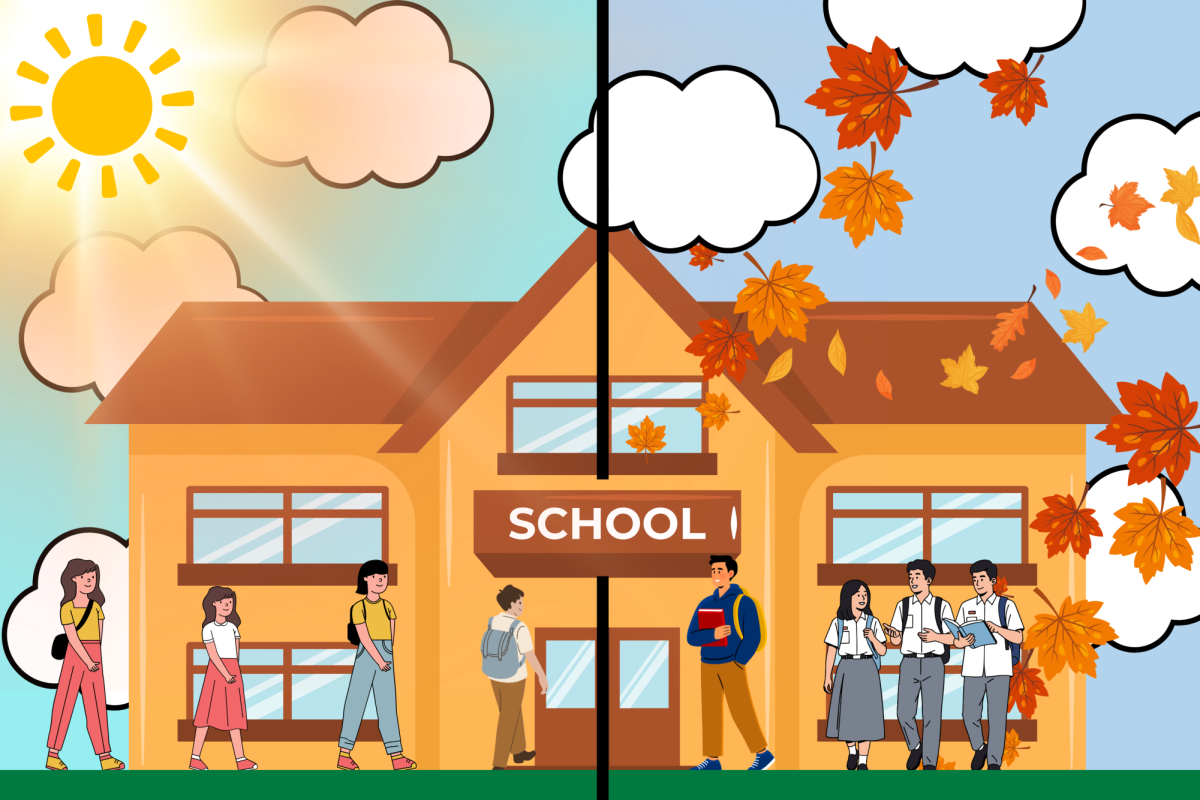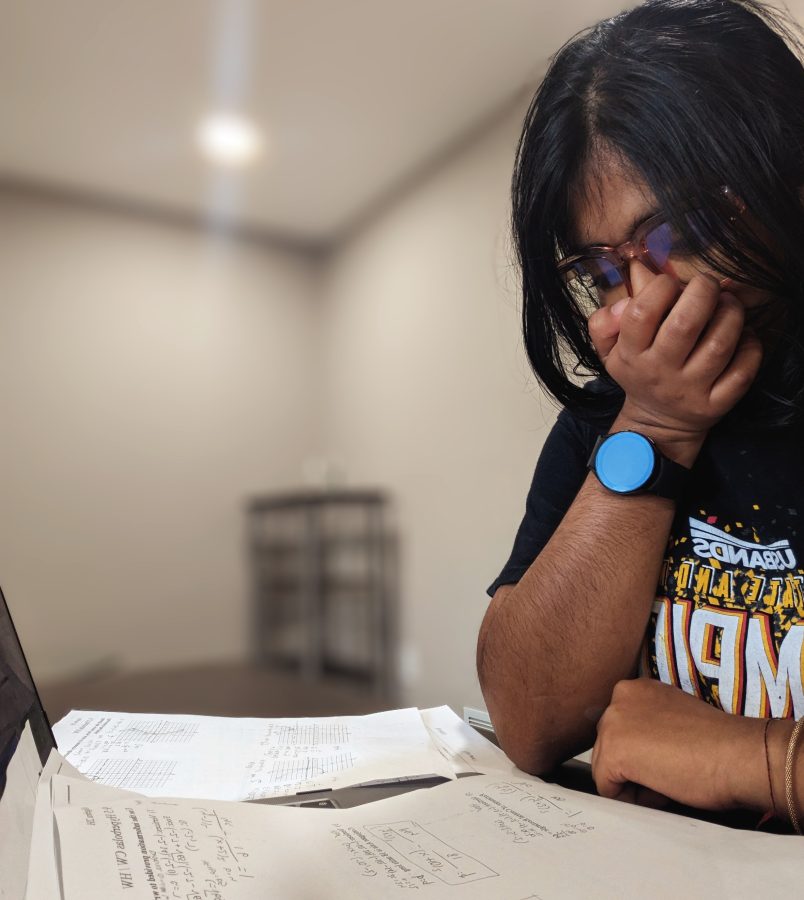The Mental Health Dilemma
Excused Mental Health Days at EHS?
With the increasing stress of a high school student, some students may find respite in taking mental health days. Others may experience more isolation and stress.
May 30, 2023
From “You Matter!” banners adorning Google Classroom pages to Social Emotional Learning (SEL) lessons and the Mindfullness and Calming Center (MACC), Edison High has seen increased mental health advocacy.
Mental health awareness has become an ever-growing movement. With research and activism, ill-equipped mental asylums from the early and mid-1900s have slowly transitioned into well-rounded institutions for therapy, medication, and counseling. As time has passed, mental health has become less stigmatized and has been prioritized even more after the COVID-19 quarantine. “It’s okay not to be okay” and “You never know what others are going through” has become common mantras in classrooms, with SEL increasingly being implemented into everyday curriculums and school-wide activities.
While most have re-entered their pre-pandemic routines, the mental health crisis still continues to worsen. According to MedPage Today, suicide rates have increased by 30% in the past decade. Chronic absenteeism has reached its highest rates, much likely due to the increased stress put on students. In turn, many state legislators are now pushing to officially adopt “mental health days.”
With these new mental health days, students would be allowed to take excused days off for mental health reasons. Mental health days would be comparable to religious holidays and sick days. Twelve states, namely California, Maine, Virginia, Colorado, Washington, Illinois, Connecticut, Arizona, Utah, Nevada, Kentucky, and Oregon, have already passed legislation approving mental health days. Virginia and Oregon adopted these laws pre-pandemic in 2019, while the remaining ten states established their laws during or after the pandemic.
New Jersey’s northeastern neighbors, New York and Pennsylvania, have proposed similar legislation, leading New Jersey lawmakers to raise the question in the state legislature.
Edison High students express much support for the idea of mental health days.
“I think a lot of students need a break. These mental health days could really benefit a lot of students,” said Srihari Senthilkumar ‘24.
Students specifically expressed their support for the increased flexibility surrounding personal health days.
“High school can be really stressful at times and having that day where we can take time for ourselves is good,” said Chaithanyasri Krishnakumar ‘26. “We all have those bad days and sometimes taking a day off is what we need to get back up.”
Despite the strong support for mental health days, concerns surrounding their application do arise. Instead of utilizing the day to restore one’s mental well-being, these days could be used by students looking to slack off. Both students and teachers worry some may use “poor mental health” as an excuse to miss important tests or assignments.
“I think a big problem that arises from this is that people might abuse the days and skip school,” said Brittany Lin ‘25.
“There are many students who are not struggling that would say they are, in order to miss school,” added mathematics teacher Ms. Sabrina Carbone. “As others are using the day to skip school and slack off, students may feel bad when they are using the day as they are struggling. This will further isolate students and contribute to invalidating students’ struggles and feelings.”
At Edison High, excused mental health days could help bring awareness to the importance of mental health. Believing most students would abuse these mental health days may further stigmatize the mental health of the student body.
“It undermines the reasons why students may take a mental health day, and makes students less likely to take one for their well-being,” said Lin of the potential abuse.
Furthermore, some expressed the belief that abuse of the system would be avoided as true mental health recognition becomes ingrained into the larger Edison High culture.
“It’s a fear anyone would have as a decision maker, but I would hope people would use mental health days as any other excused absence, and hopefully as it becomes a part of the school culture people would use the mental health days as necessary,” said English teacher Mr. James Napoli.
Still, some students and staff believe that the abuse of mental health days can be prevented.
“I think that adding limitations will combat the abuse problem and make it evident for those that may need professional help,” said Anika Yadavalli ‘26.
To address the potential abuse of mental days in the US, states have restricted the number of mental health days per student. One such example is the maximum of five days implemented in Illinois.
In a 2022-2023 senate session, New Jersey lawmakers provided loose guidelines for excused mental health days in Bill S2151. According to the New Jersey Senate, a student’s mental health absences would not count towards their unexcused absences, but the absences could result in students being referred to professional support staff at their school. The absences must also be verified by school officials and approved with nonmedical documentation.
This caveat, however, introduces a new problem of privacy and confidentiality for students struggling with mental health. While it may be beneficial for students to be checked on by staff at school if they are displaying signs of poor mental health, forcing students to convene with professionals after two days of mental health absences may dissuade students from being open about their mental health, potentially destroying the very purpose of the days.
“I definitely understand how some students may feel uncomfortable with administration knowing about their mental health,” said Yadavalli. “Some students will then not take mental health days, which could worsen their mental health.”
While mental health days may serve as a day for students to relax, they may also pose a dangerous space in which someone who is struggling could harm themselves and feel more isolated at home. Due to this possibility, students and teachers recommend more mental-health-related activities at school.
“I remember in middle school we would have days where we would do meditation and other stress-relieving activities,” said Senthilkumar. “They were very calming and made handling stress better at school.”
“Where I’ve had troubles with mental health in the past, I do not think my off days helped me as much as the days I was with others,” added Carbone. “I think the idea of at-school mental health days and activities would be great. I think student’s can heal better around their peers and teachers than alone.” She furthermore explained that mental health activities at school would help reach a broader scope of students and would increase awareness of mental health and proper coping strategies.
“Many times it’s hard to verbalize the struggle they face and these activities can make them feel understood and acknowledged, which is what most students want,” said Carbone.
In-school activities may not only help those who are currently struggling, but also teach students how to cope with stress and feeling overwhelmed. By spreading awareness and teaching students proper ways to take care of their mental well-being, students may be increasingly able to make decisions that benefit themselves.
Excused mental health days may provide the support students need in a fast-paced world, providing time for relaxation, reflection, and rejuvenation when feeling stressed and overwhelmed. However, the potential abuse and creation of a space in which students could put themselves in danger are relevant points of concern.
In both the United States and at Edison High at large, mental health continues to be a consequential topic, with new stressors or triggers created each day, whether they be hours of homework, toxic body trends, or bullying. While it may seem that lawmakers have control over the current mental health epidemic, it is important to remember that we still have power in this situation. You have the power to not only change your day and perspective, but also positively impact the life of another student for the better.
For more information on mental health, visit https://www.mentalhealth.gov/.
If you or someone you know is experiencing a mental health crisis, text 741741, text 988 for the Suicide and Crisis Lifeline, or call 2nd Floor Youth Helpline at 888-222-2228.

























































































